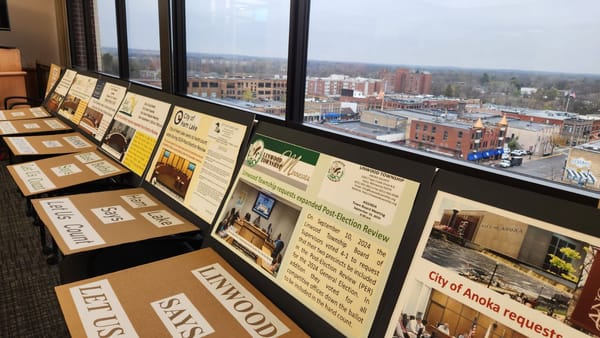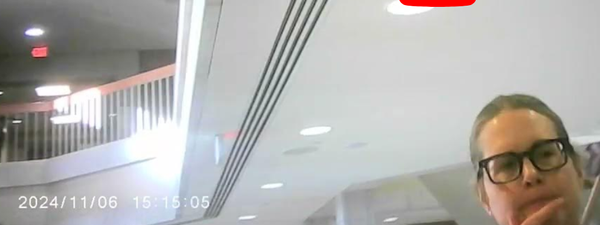A Major Party with Major (Fixable) Problems
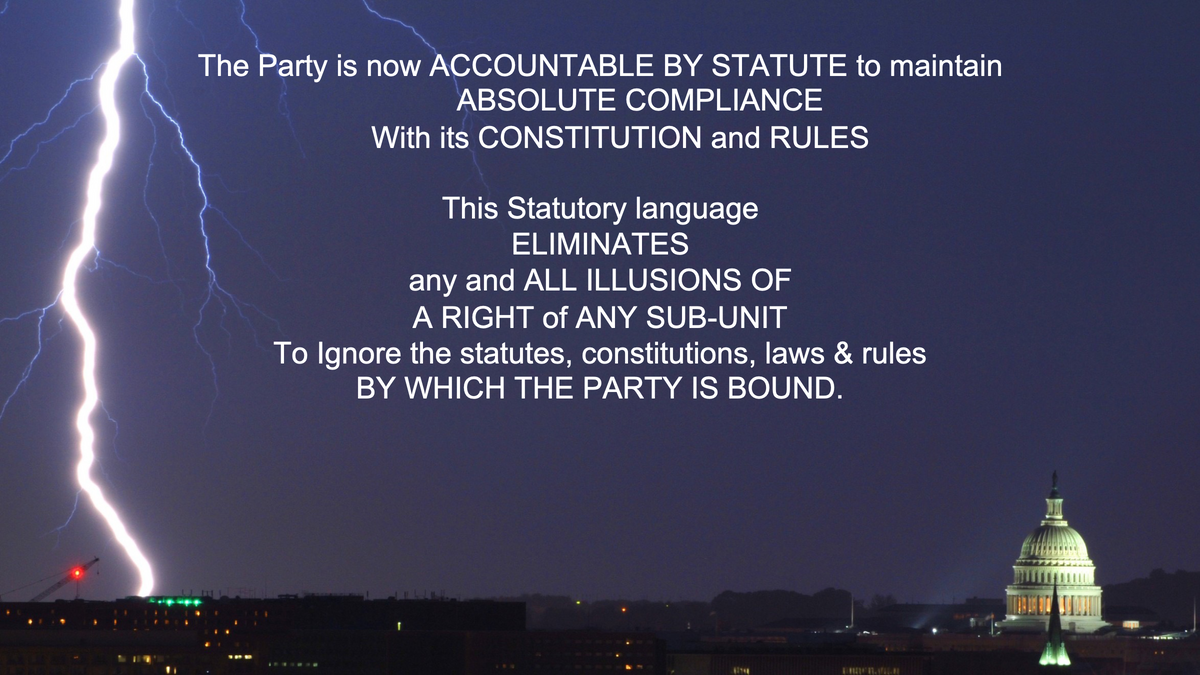
How Patriots Can Help the MNGOP Return to Compliance with a New Reasonable State Statute 200.02 Subd. 7 Which Could Revoke its Major Party Status
Written while listening to 369 Hz Nikola Tesla Frequency
What follows are 36 points, with 9 sets of questions.
Summary:
Precinct caucuses are the foundation and first in a series of elections from the perspective of which candidates end up on the ballot for major political parties in Minnesota. Precinct delegates are elected permanently according to Minnesota Statute 202A.18. But what happens if that process is corrupted such that a party is out of compliance with its own constitution and rules by, for just one example, disenfranchising duly elected delegates?
Moreover, what if, in fact, that party’s last properly adopted and filed constitution is from 1988? And what if, in fact, the same party’s 2022 constitution was not properly adopted (amendments merely adopted as a bloc)? Finally, what if, in fact, the current party Chair submitted documents to the Minnesota Office of the Secretary of State in such a way as to it appears perjure himself relating to the not-yet adopted constitution?
Failing to remedy the situation, if newly passed legislation, an amended 200.02 Subd. 7. by Minnesota’s 93rd Legislature is enforced, the Minnesota Republican Party after December 1, 2023 could well lose major party status, along with large consequences such as forfeiting the precinct caucus model and election judges to safeguard our sacred voice in politics as represented by our votes.
From here, there is a path to reclaiming the party for the people so that it not only comes into compliance with its own not-yet adopted constitution and rules but also with the new reasonable legislation which says major political parties must be in compliance to that end, and also must certify that they are.
This three-step path will lead to significant change in Minnesota politics:
- Starting with a state central delegate meeting and followed by a state convention, the Republican Party gets back into compliance with the reasonable new legislation and also generally unifies
- Precinct caucuses on February 27, 2024 set attendance records
- Healthy conversations and debates continue about the Party’s constitution, principles, and path ahead leading into the 2024 primaries and the 2024 general election on Remember, Remember, the 5th of November
To date, the dysfunction and lack of proper focus of the Minnesota Republican Party served to aid the current stranglehold on power seen in the state’s capitol, St. Paul. On the other hand, in the future, a functioning Minnesota Republican Party focused on its principles poses the biggest threat to the current regime’s trend toward total control. It is completely within hand to change course immediately.
This post is written for all Minnesotans—because the actions taken by readers of this post will affect every Minnesotan—but in particular it is written as a call to action for current delegates and members of the Minnesota Republican Party.
If each reader of this post visualizes just one person to speak with about this topic, and then one more, each day for the next 12 days (and each of those people do the same), nearly every republican voter in Minnesota will have had a chance to learn and be informed before September ends. The power of truthful speech will attract and align many to this cause.
36 points
1.
Precinct caucuses are outlined in Minnesota Statute for political parties with major party status and are chiefly for:
Electing delegates, the first election in a chain of elections for major political parties in Minnesota
- There are about 4,000 precinct delegates; shortly after precinct caucus, those delegates, in a basic political organizing unit (BPOU) convention elect about 2,000 state convention delegates (and about 1,000 alternates). It is possible to be both a precinct delegate and a state convention delegate. This election occurs in even-numbered years.
- In odd-numbered years, the precinct delegates elect state central committee delegates (about 350 and about 175 alternates). It is possible to be both a precinct delegate and a state central delegate. (As well as all 3, a precinct delegate, state convention delegate, and state central delegate.)
Political parties without major party status need not hold precinct caucuses.
2.
The state convention is an elected body by the precinct/BPOU delegates., which is “the final authority over the affairs of each political party” (MN Statute 202A.12).
3.
At meetings of the state convention in election years, candidates are endorsed, and other business may occur. The state central committee and the party chair are beholden to the state convention body, or delegates. (See Point #2.)
4.
If precinct caucuses are corrupt, is not the election process thereafter is immediately called into serious question?
For example, the Republican Party’s Otter Tail County precinct caucuses on February 1, 2022 were certainly corrupt and one party member admitted to that in this conversation.
The outcomes of this delegate list fraud are likely to have affected the endorsed candidate for senate who is also the currently sitting senator. (The write-in candidate, Nathan Miller, protesting this fraud received a record vote proportion of more than 8% in the 2022 midterms and was also litigated against by the MNGOP.)
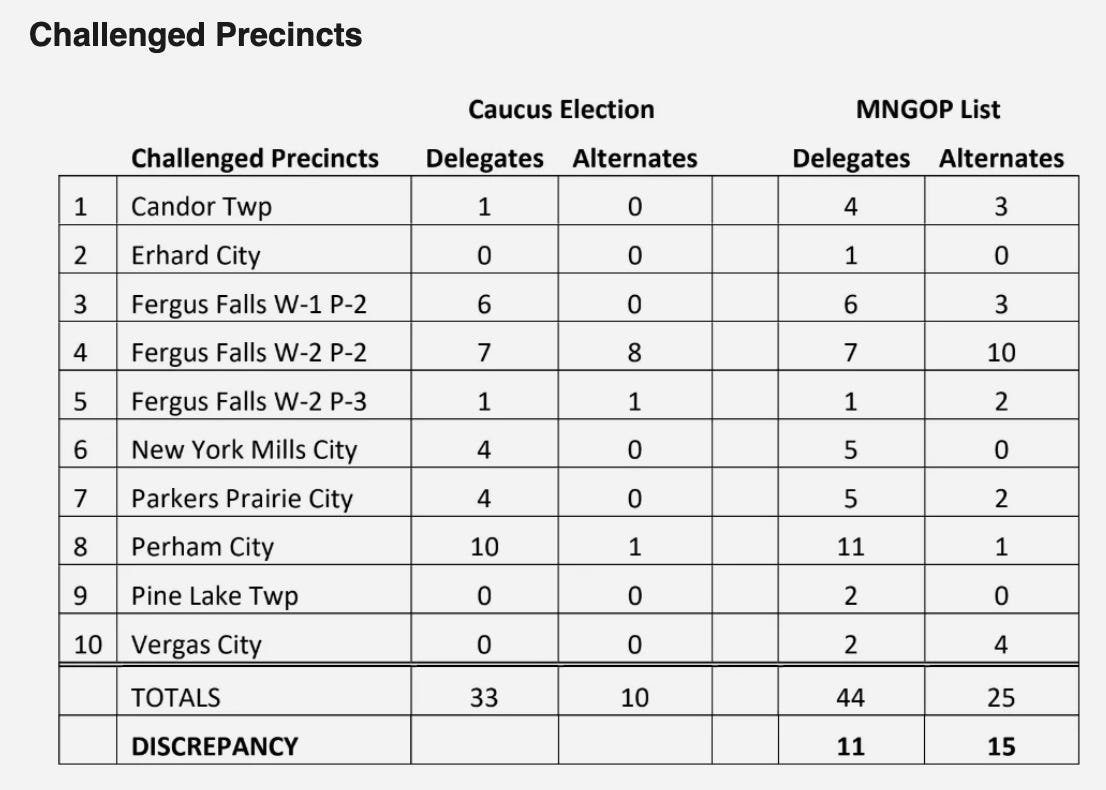
As described in Point #1, this fraud also likely affected the delegate election for state convention body in 2022 and the election for state central committee in 2023 when 35 duly elected delegates were deemed unfit to participate because they’d chosen not to vote for an illegitimate senate candidate installed through a fraudulent process. (They had instead voted for the write-in candidate standing on principle.)
Otter Tail was not the only county in Minnesota with serious concerns raised. At the time of this writing, all cases remain unresolved. Instead of failing to address this, a mitigation or dispute committee could be created with the party to hear the case.
5.
Do most of the 1.5-2 million republican voters in the state of Minnesota know about the disenfranchised delegates in Otter Tail County?
Are there other cases of delegate list fraud outside of Otter Tail County?
Yes, see Morrison County. Are there other untold stories? What was the magnitude of this delegate list fraud?
Was the fraud minor or widespread? Was it enough to alter the outcome of an election? Yes, at least one senator should likely not be seated.
Once aware, is it the responsibility of delegates in the state convention to not only bring awareness to one another and the body but also to seek its resolution?
6.
The next precinct caucuses are scheduled for February 27, 2024.
Participation as measured by the governor straw poll increased more than 60% from 2018 to 2022.
It is expected that participation from 2020 to 2024 will also increase, especially with current events and increased awareness of how to participate in local politics and the recognition that it is vital for citizens to participate in their civic duty if they with to live free and peacefully in a constitutional republic.
Points #4, #5, and #6 describe a significant area where the party has violated state statute and is also out of compliance with its own constitution and rules—because once elected, precinct delegates cannot be removed (they are permanent under 202A.18) unless by a subsequent election, which has not yet occurred (precinct caucuses are scheduled for Feb 27, 2024).
This is important to establish because new reasonable legislation requires major political parties to also be in compliance with their own party constitution and rules.
So, although there are more areas where the Minnesota Republican Party is out of compliance with its own constitution and rules (revisited later in this post), we turn now to this pressing matter where the Party is out of compliance with new reasonable legislation which could see the Party lose its major party status.
7.
On May 13, 2023, a conference committee for HF1830 met and added, among other amendments, this critical one on major party status in 200.02 Subd. 7.
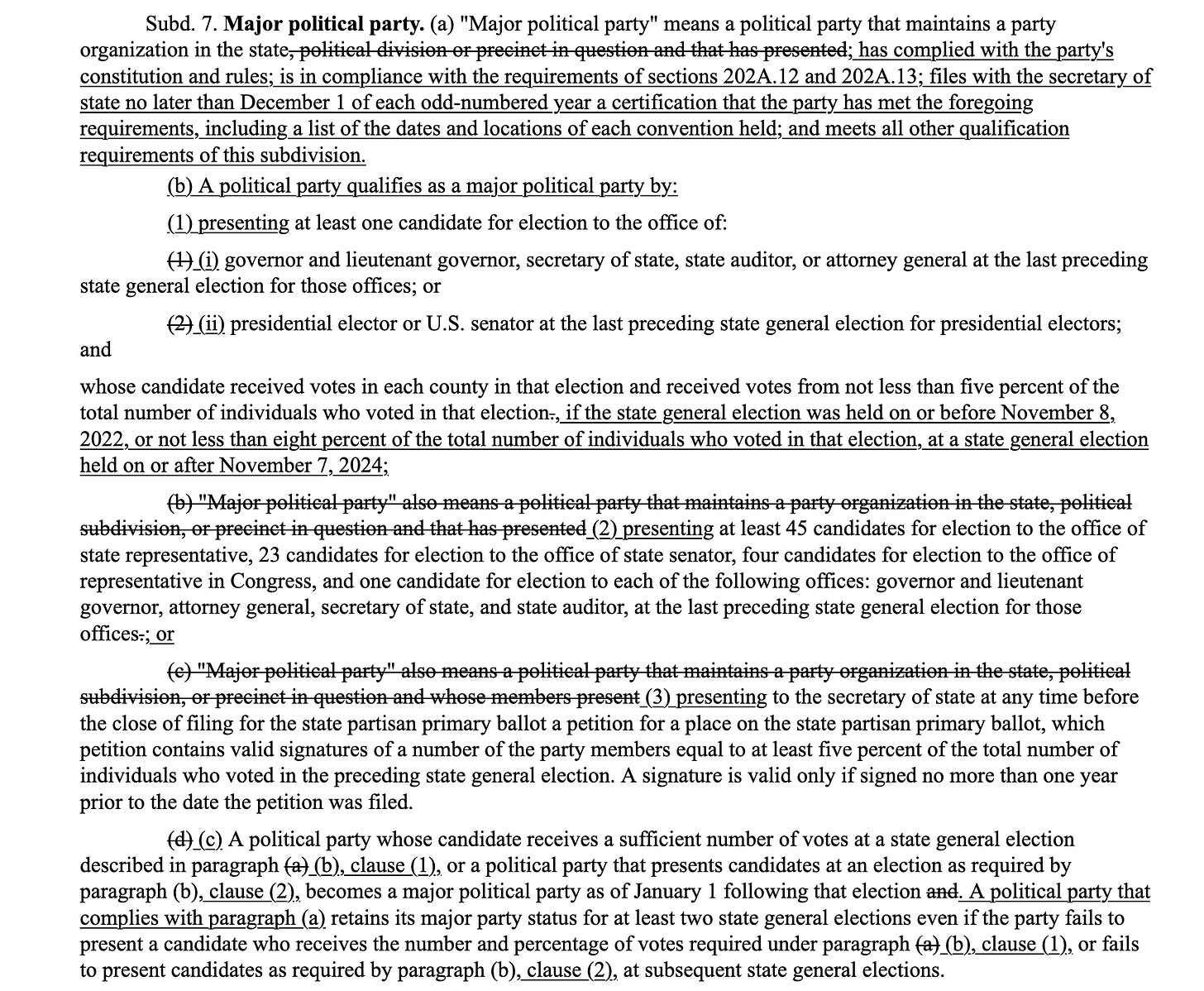

Representative Jim Nash, a Republican member of this committee, was asked whether he was either invited or attended this meeting, but is yet to reply.
8.
On May 24, 2023, HF1830 was signed into law by Governor Walz.
9.
In the August 12, 2023 meeting of the State Central Committee for the Republican Party of Minnesota, the Chair, David Hann, said he was not aware of the statutory changes made to caucus rules (important but separate from the matter at hand).
This prompted one republican to read the multi-hundred-page omnibus bill, HF1830, again, which alerted this person in particular to amended Minnesota Statute 200.02, Subd. 7. (See above, Point #7.)
The result of reading the statute can be summarized as follows...
10.
The Party is now ACCOUNTABLE BY STATUTE to maintain
ABSOLUTE COMPLIANCE
With its CONSTITUTION and RULES
This Statutory language
ELIMINATES
any and ALL ILLUSIONS OF
A RIGHT of ANY SUB-UNIT
To Ignore the statutes, constitutions, laws & rules
BY WHICH THE PARTY IS BOUND.
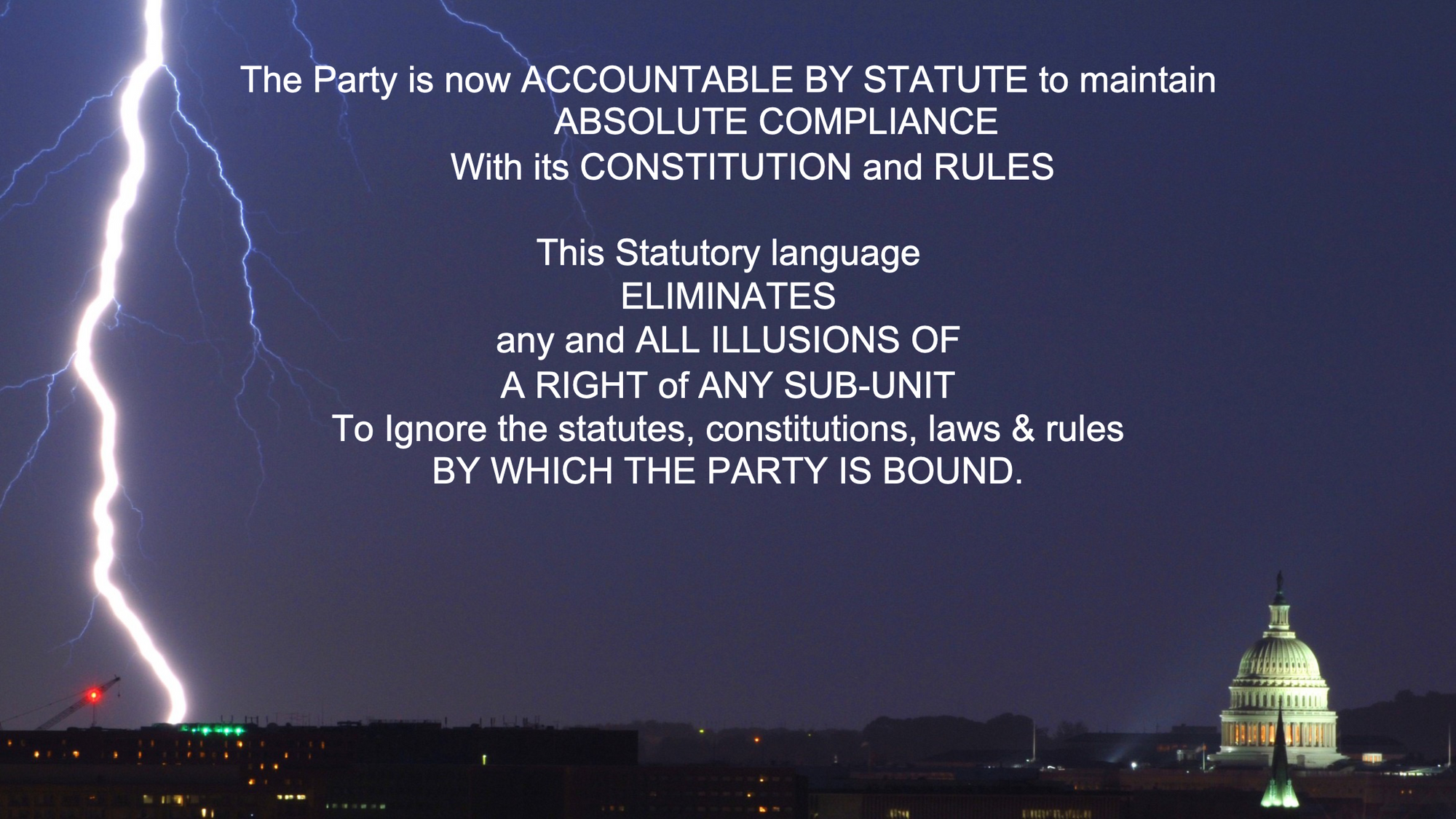
ALL bodies of the Party
MUST be in compliance with Statutes and Constitutional Provisions.
This compliance includes, but is not limited to:
Removals of Duly Elected DELEGATES
Removals of Duly Elected OFFICERS
The Rights of Delegates to Call a Meeting
The Rights of Delegates to be provided with all information necessary to provide proper oversight
The PARTY IS NOT IN COMPLIANCE
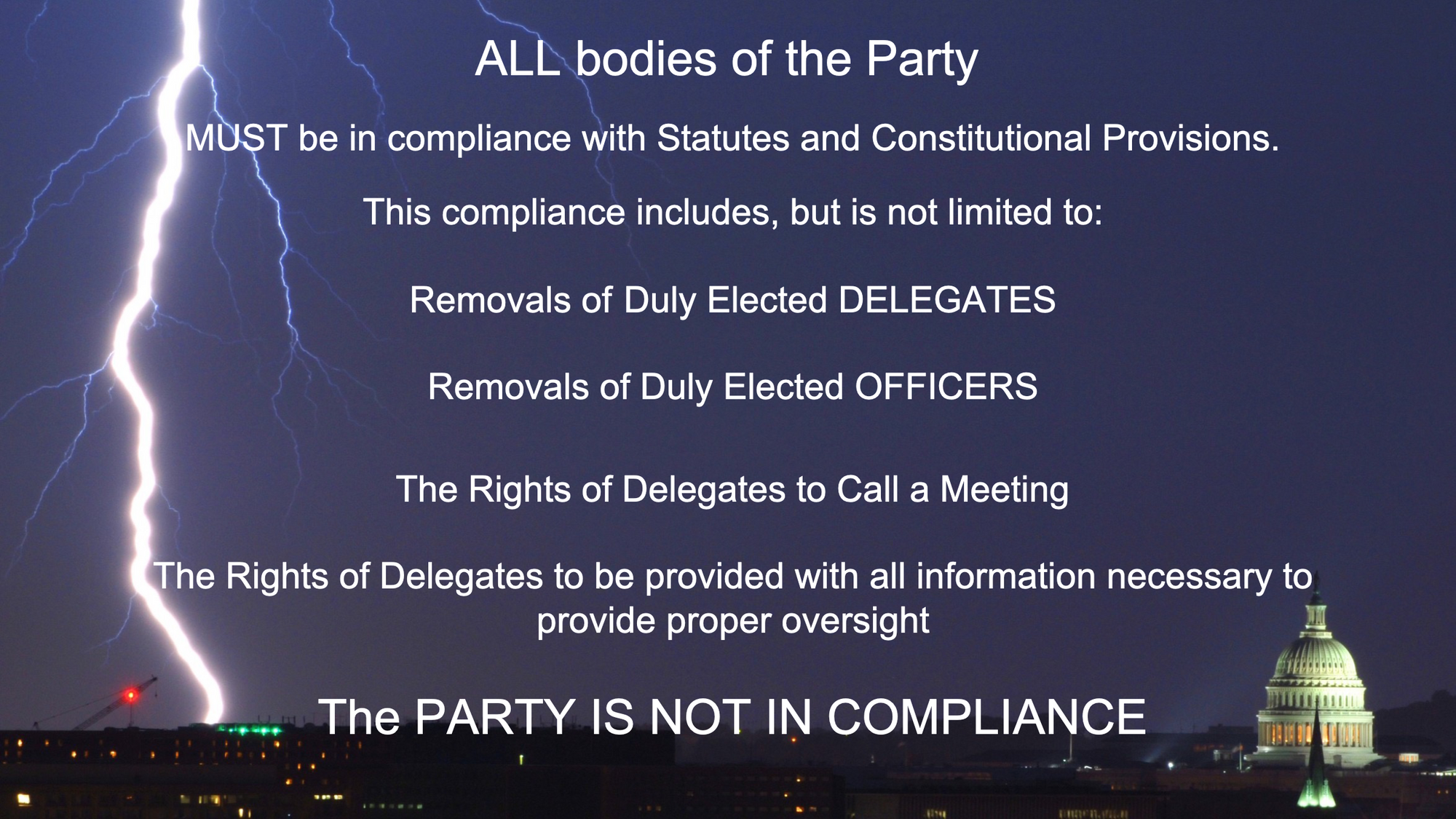
This accountability applies to the DFL Party as well. Ken Martin, Chair of the Minnesota Democratic-Farm-Labor Party was emailed for comment on this legislation, in particular on whether it should apply to the DFL and GOP, but is yet to reply.
11.
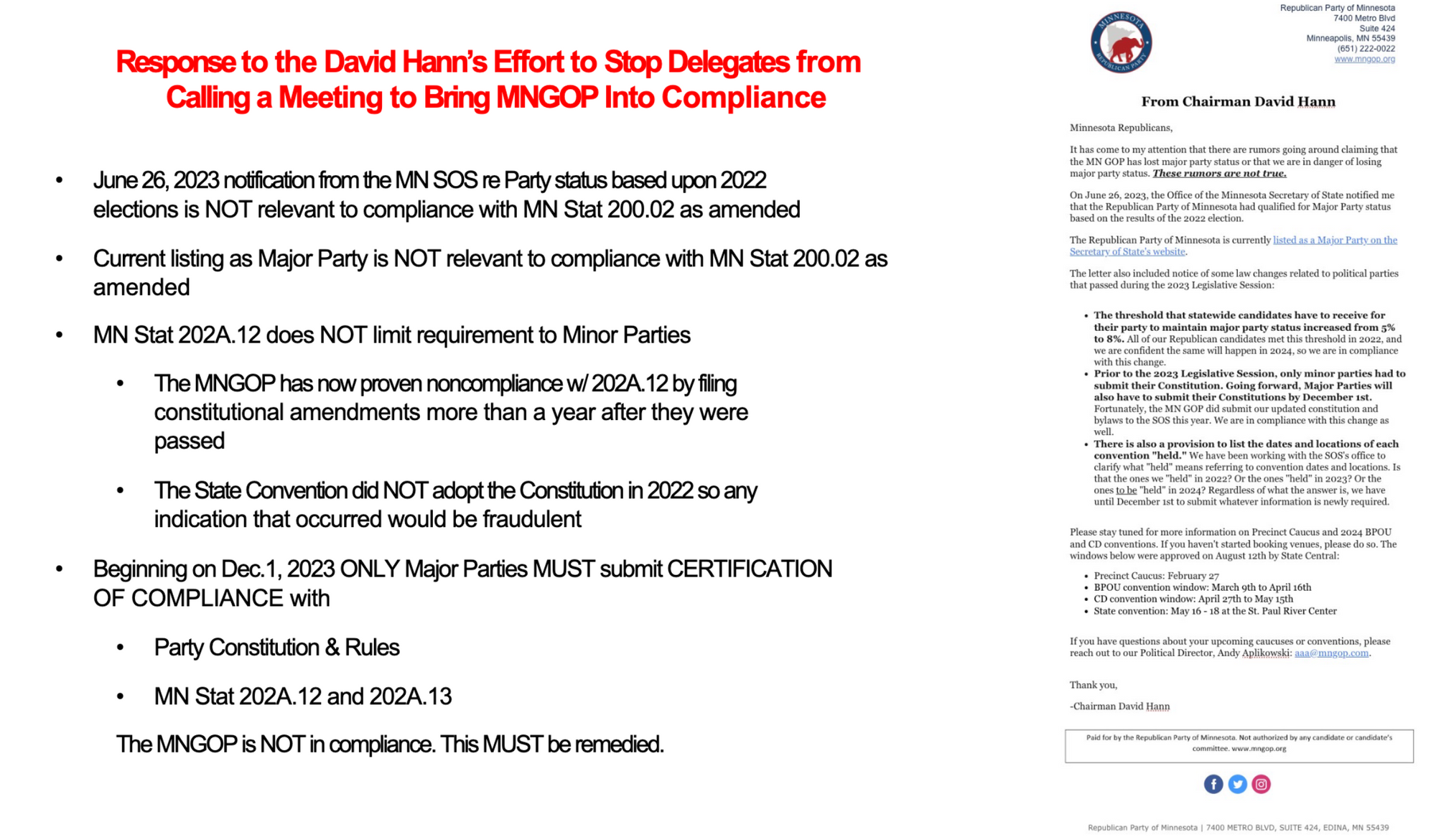
The MNGOP Chair has filed the 2022 constitution with the Minnesota Secretary of State (MNSOS), but this constitution was never adopted by the state convention. Is the constitution valid?

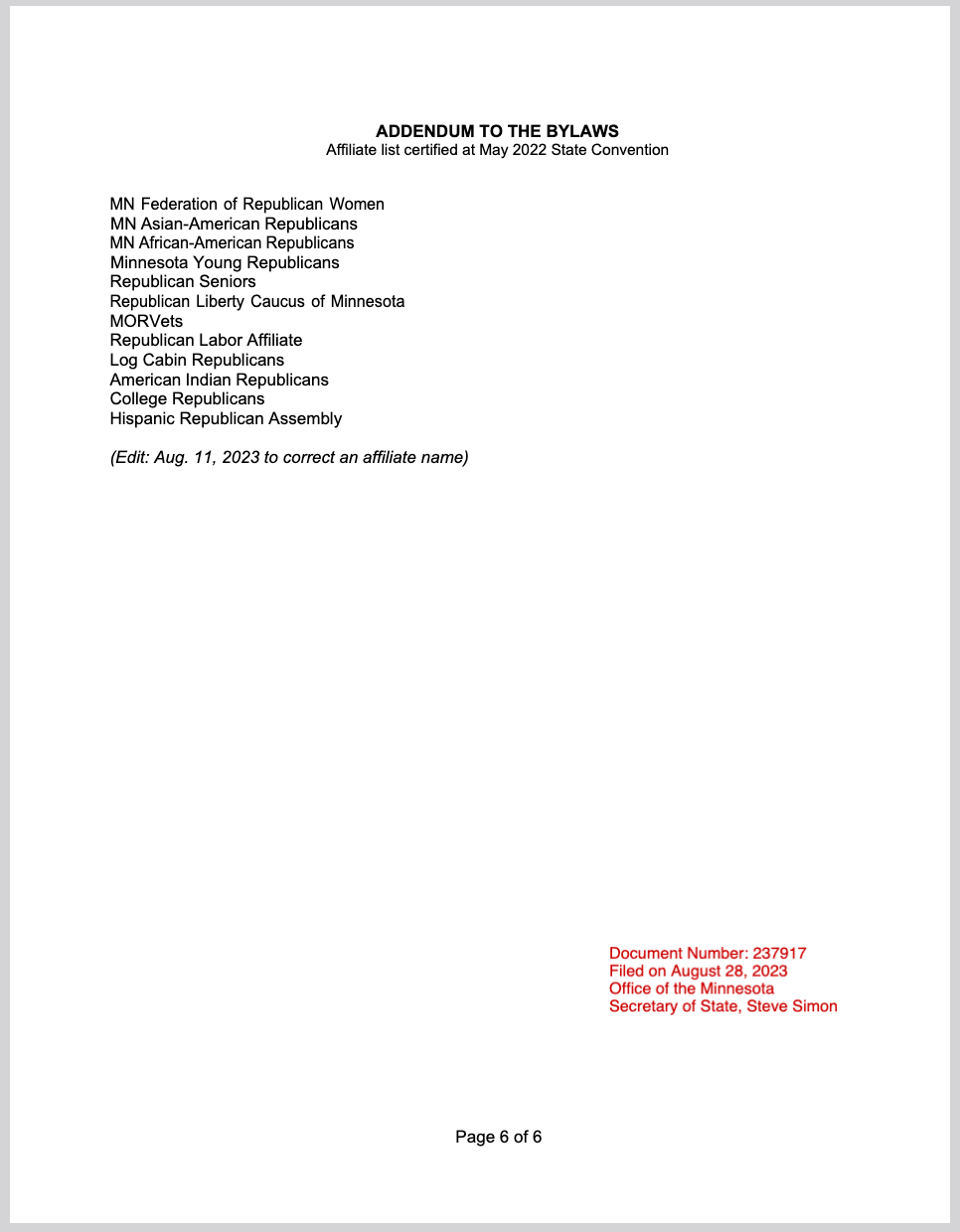
12.
The Chair of the MNGOP claimed that the document(s) in Point #11 satisfy the newly passed legislation. But do they?
A letter was sent to the Office of the Minnesota Secretary of State inquiring about the documents submitted by the MNGOP Chair.
Note the first question and response…
Question: Does the MNSOS office verify the truthfulness of a submitted document by certifying the receipt of a document.
Response: No.
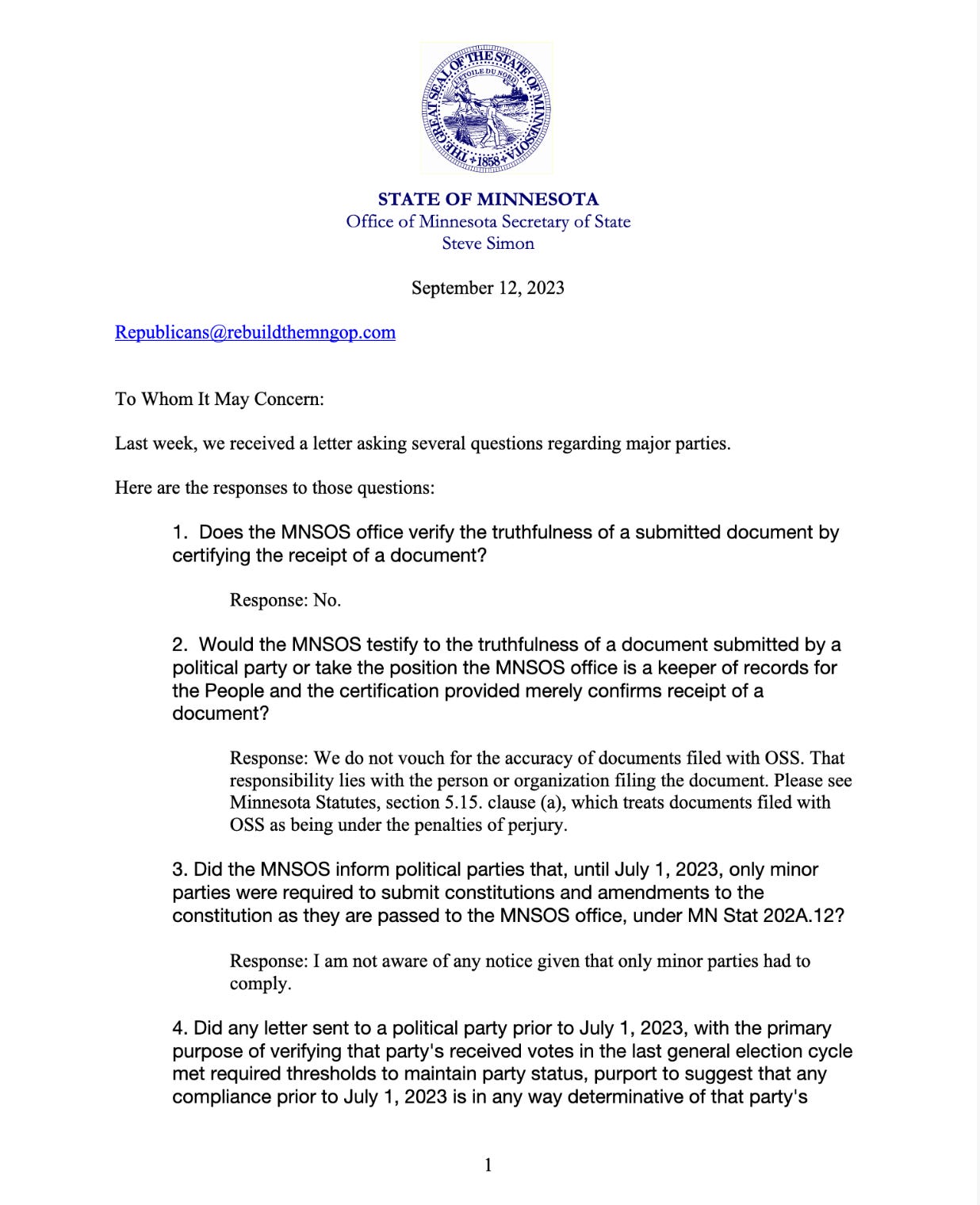
13.
Question: Would the MNSOS testify to the truthfulness of a document submitted by a political party or take the position of the MNSOS office is a keeper of records for the People and the certification provided merely confirms receipt of a document?
Response: We do not vouch for the accuracy of documents filed with OSS. That responsibility lies with the person organization filing the document. Please see Minnesota Statutes, section 5.15. clause (a), which treats documents filed with OSS as being under the penalties of perjury.
14.
Question: Did the MNSOS inform political parties that, until July 1, 2023, only minor parties were required to submit constitutions and amendments to the constitution as they are passed to the MNSOS office, under MN Stat 202A.12?
Response: I am not aware of any notice given that only minor parties had to comply.
15.
Question: Did any letter sent to a political party prior to July 1, 2023, with the primary purpose of verifying that party’s received votes in the last general election cycle met required thresholds to maintain party status, purport to suggest that any compliance prior to July 1, 2023 is in any way determinative of that party’s compliance with or party status under any statutes or requirements that became effective July 1, 2023 or later?
Response: Not to my knowledge. However, party status for the entirety of calendar year 2023 was determined by the former method requiring a party statewide candidate to receive votes in all counties and at least five percent of the votes cast for that office. Party status for calendar year 2024 and subsequent years, is determined under the method adopted by the 2023 Legislature (emphasis mine).
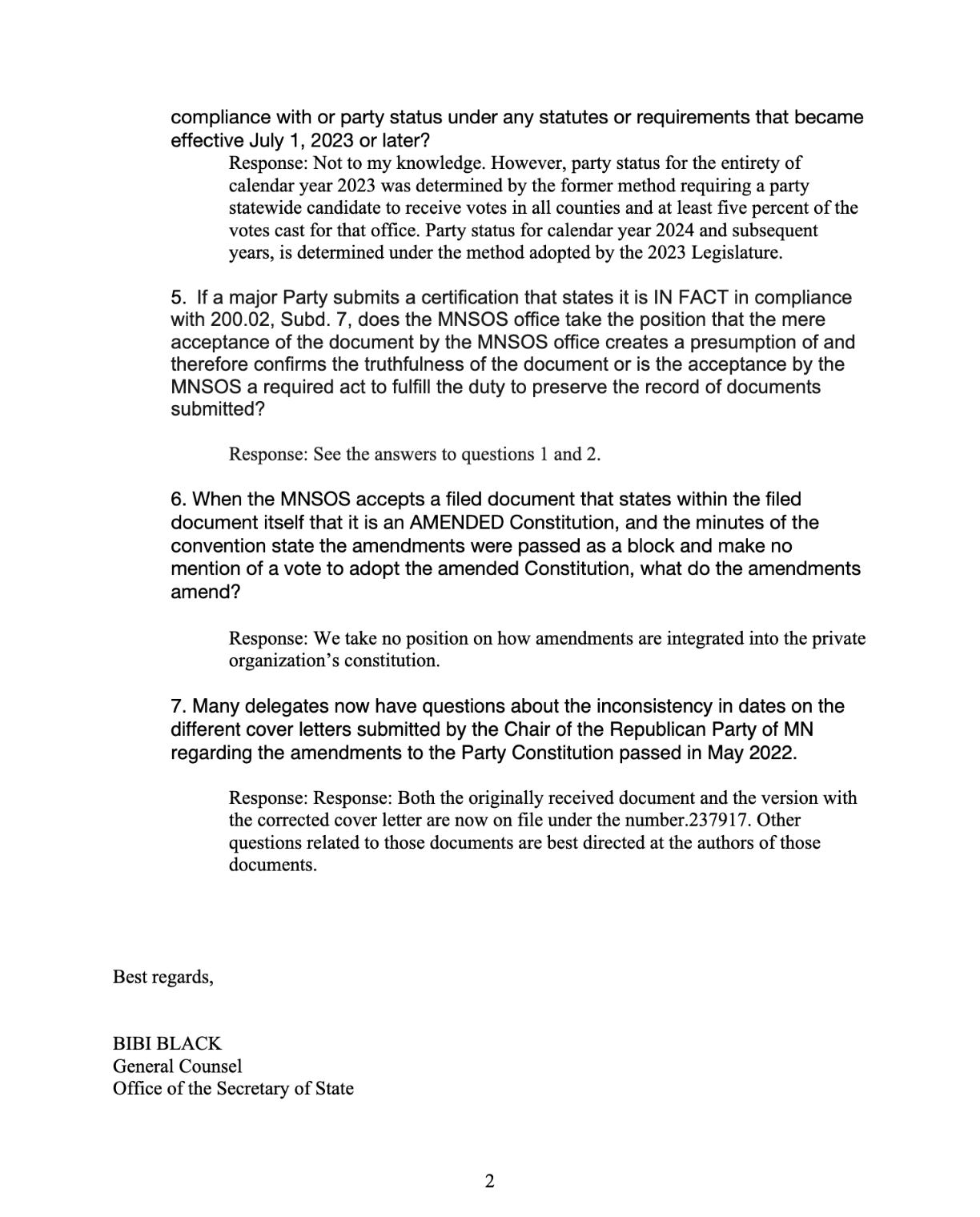
16.
If a major Party submits a certification that states is is IN FACT in compliance with 200.02, Subd. 7, does the MNSOS office take the position that the mere acceptance of the document by the MNSOS office creates a presumption of and therefore confirms the truthfulness of the document or is the acceptance by the MNSOS a required act to fulfill the duty to preserve the record of documents submitted?
Response: See the answers to 1 and 2. (Points #12 and #13 in this post.)
17.
Question: When the MNSOS accepts a filed document that states within the filed document itself that it is an AMENDED Constitution, and the minutes of the convention state the amendments were passed as a block and make no mention of a vote to adopt the amended Constitution (emphasis mine), what do the amendments amend?
Response: We take no position on how amendments are integrated into the private organization’s constitution.
18.
Question: Many delegates now have questions about the inconsistency in dates on the different cover letters submitted by the Chair of the Republican Party of MN regarding the amendments to the Party Constitution passed in May 2022.
Response: Both the originally received document and the version with the corrected cover letter are now on file under the number 237917. Other questions related to those documents are best directed at the authors of those documents.
19.
Bibi Black, General Counsel to the MNSOS, in her response to Question 2 mentions Minnesota Statute 5.15.
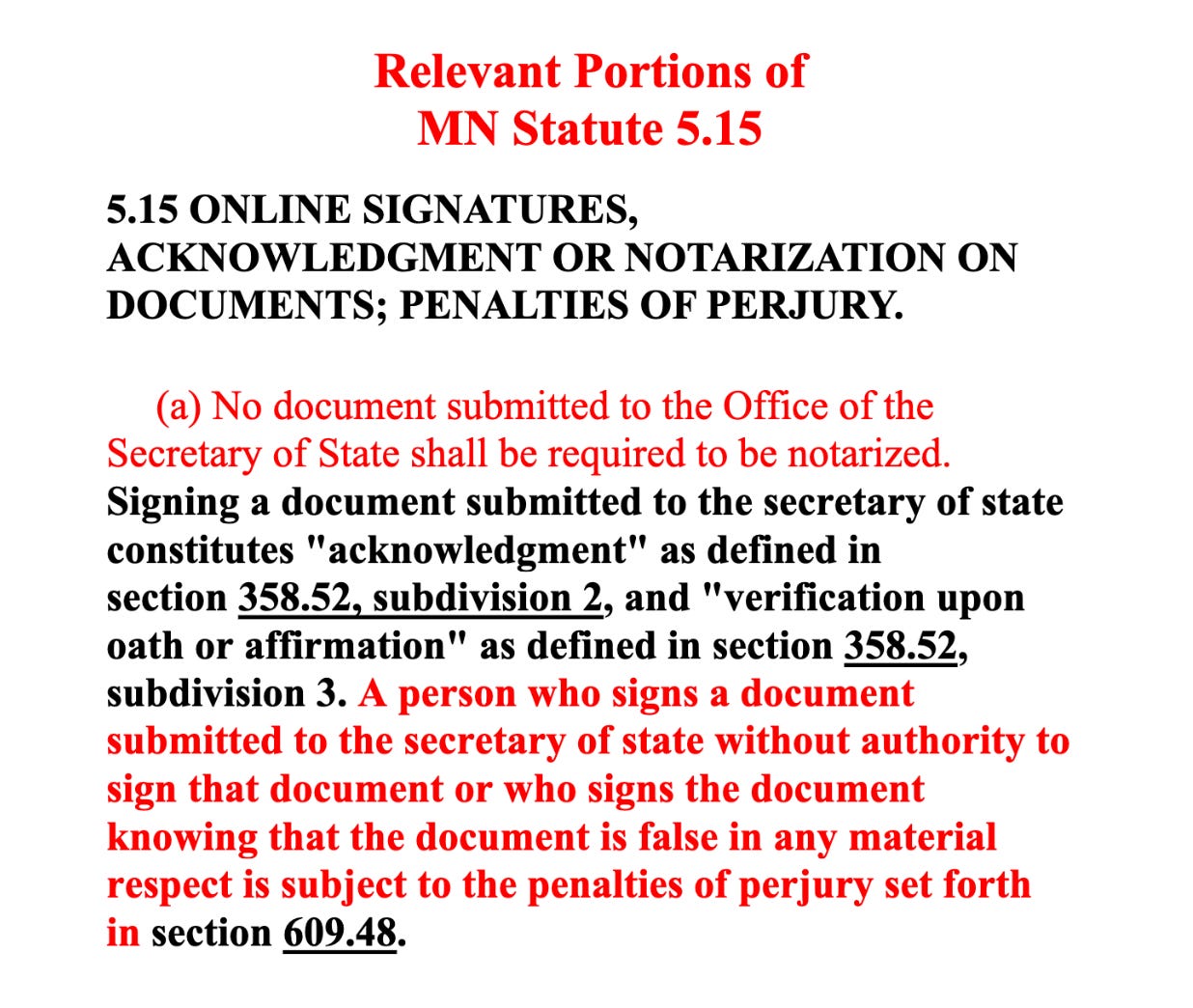
20.
Section 609.48 reads:
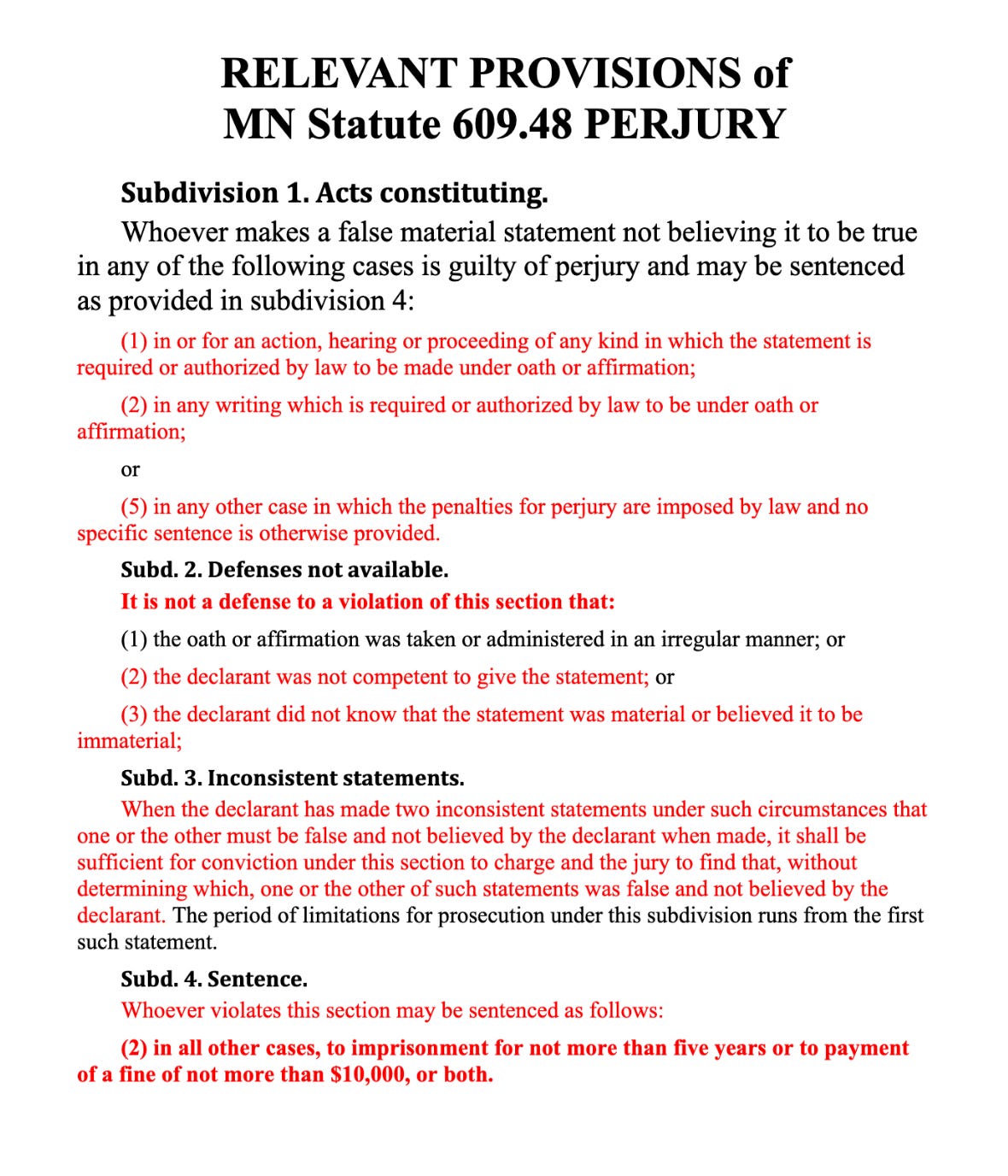
21.
What are the consequences of losing major party status?
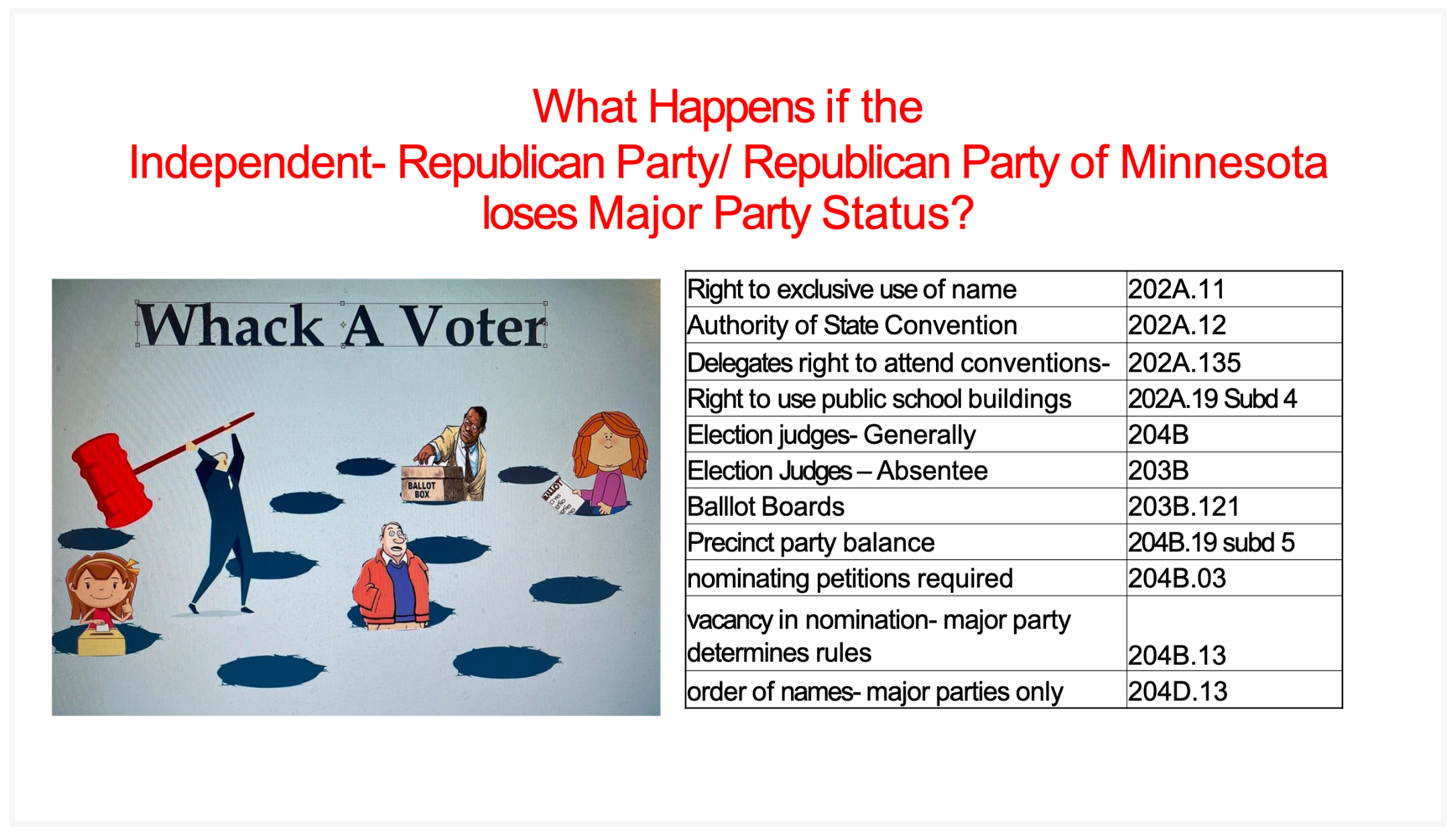
Now, having begun by talking about the foundation of precinct caucus, we then moved into a discussion of the newly passed legislation. Before returning to what can be done, a few more instances of the MNGOP working against itself, against duly elected delegates and officers, as well as candidates, shall be outlined.
The first is the attempted removal of an officer.
22.
Calvin Benson, who worked as a Fischbach staffer, led the fake removal in Clay County against Clay County BPOU CHair, Edwin Hahn. Benson now works for the political consultant/lobbyist arm of Lockridge, Grendel, Nauen—they are the DFL law firm who partnered with Perkins Coie and Mark Elias to fight against Edwin Hahn's 2020 election contest.
The MNGOP has now sued Edwin Hahn—but should they have sued? Isn't this an interparty dispute?
23.
Edwin and Lisa Hahn were not allowed into their senate district convention. This was not the last meeting Edwin Hahn, Chair of the Clay County BPOU, was blocked from participating.
24.
A trend of blocking participation and involving police force developed among some leaders in the MNGOP.
- In May 2022, the Rochester police were called to remove Edwin Hahn from the line to enter the meeting of the MNGOP State Convention. He was removed.
- At the December 2022 State Central Committee meeting in St. Cloud, Executive Director Mike Lonergan called the police on Erik van Mechelen and he was issued a trespassing advisory. He left the building with the police.
- After refusing to seat her and two others, CD3 Chair Randy Sutter asked that the police be called on Molly Bellmont of SD50 at the CD3 committee meeting but she left before the call was made.
25.
The MNGOP is in significant debt ($500,000), perhaps due to the large sums being spent on various lawsuits.
$250,000 was expensed in 2022 to the law firm suing Edwin Hahn (though not all can be attributed to Edwin's case as Action 4 Liberty and Nathan Miller were also litigated, and possibly others, for instance Jennifer Carnahan is suing the party).
The MNGOP has tried to settle the case they brought against Edwin Hahn.
$500,000 of debt is mentioned in the following recap by Jon Ross from the August 12, 2023 State Central Committee meeting.
26.
A letter signed by Chair David Hann and Treasurer Lee Prinkkila suggests that the Kittson County BPOU is out of compliance with the Campaign Finance Board and has therefore lost its status as a BPOU (basic political organizing unit).
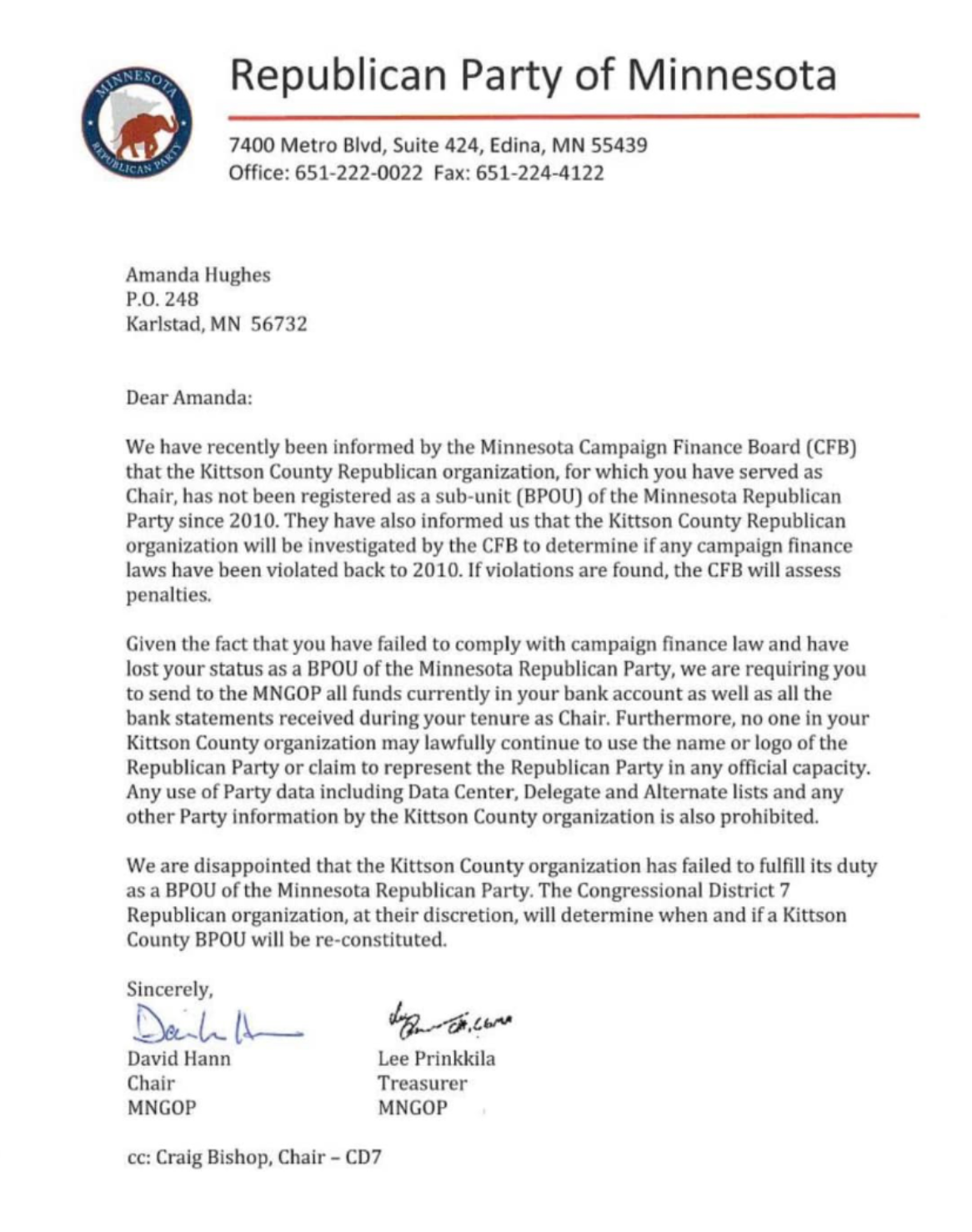
However, this suggestion was false and therefore the action taken by the MNGOP was incorrect.
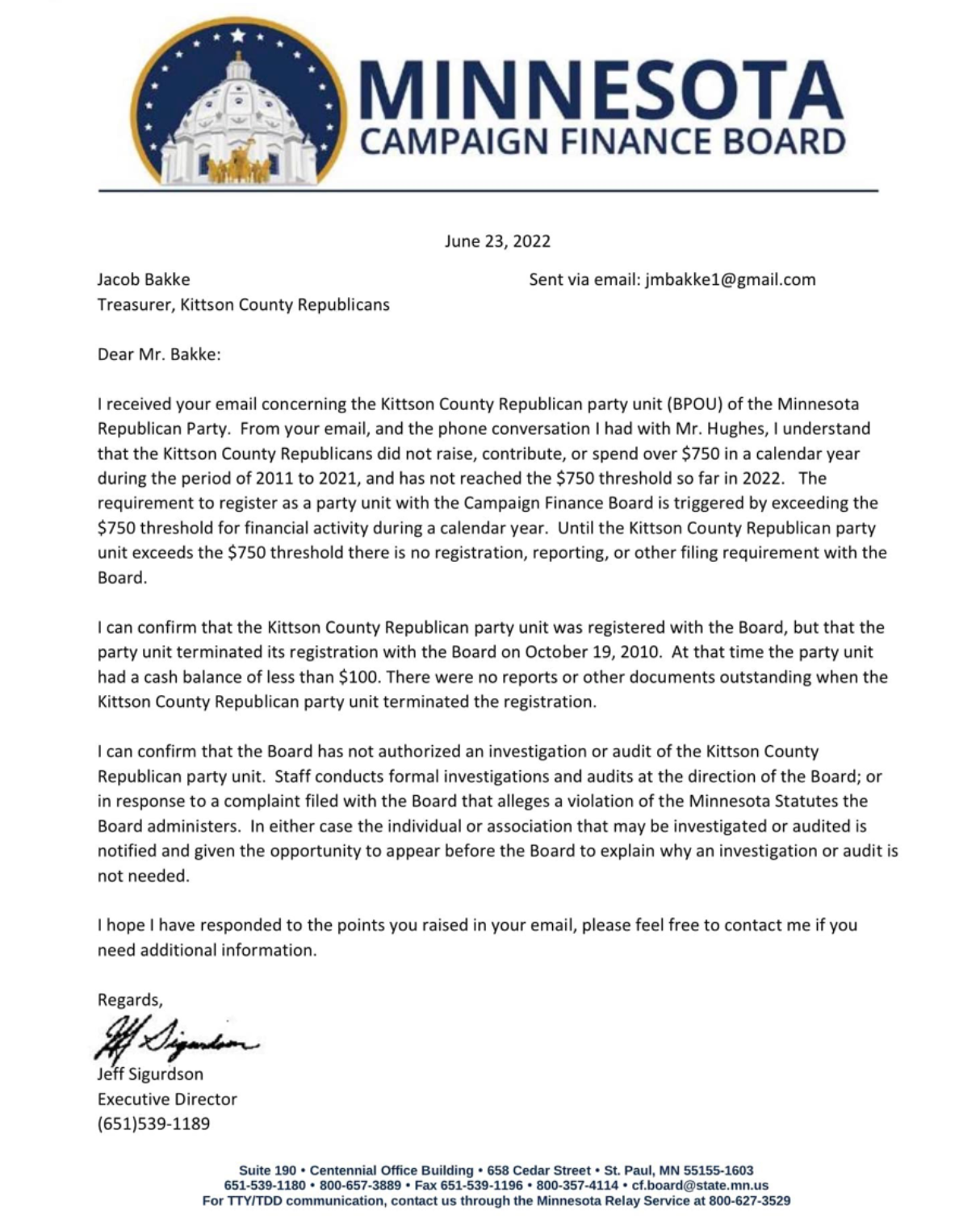
27.
In the Senate District 10 convention in 2022, the convention was unable to finish counting ballots after several hours, called recess, but never reconvened, meaning no candidate was endorsed heading into the August 9, 2022 primary election. It appeared that then candidate Nathan Wesenberg was favored, and he did win the primary election as well as the 2022 midterm election to be seated now as Senator Wesenberg.
28.
The MNGOP denied Erik van Mechelen access to the secretary of state endorsement process in 2022. van Mechelen was not given any reasons by email or phone. When asked why 6 months later in person, Executive Director Mike Lonergan called the police and issued a trespassing advisory. van Mechelen walked out with the police, two young men who then heard his side of the story and were introduced to the newsletter, Midwest Seeds.
29.
Senate District 50, in the heart of CD3, also containing the MNGOP Edina headquarters, held elections which as an observer to the counting and tallying Erik van Mechelen noticed errors which once corrected changed election outcomes. No formal audit has yet been done even though some of the newly elected officers wished to.
Erik van Mechelen believes cheating may have occurred for the state central delegate election as one against-trend candidate became a delegate and the author was not able to watch the counting or computer input for that specific election. Unfortunately, within 24 hours, it was said that the state central ballots were shredded (and only those ballots) which means only the computer tally is available.
This occurred in the same senate district where a candidate, Sami Cisman, with fake credentials was pushed by the party and where in July 2023 the CD3 Chair Randy Sutter said the police should be called on Molly Bellmont of SD50 after refusing to seat her and two others. This same CD3 Chair was in the room multiple times before and during the counting and tallying from the March 4, 2023 SD50 convention.
31.
Review the consequences to losing major party status outline in Point #21.
Given concerns raised about ballot chain of custody, lacking visibility into absentee ballot boards (where absentee and mail-in ballots are received, accepted/denied, signature-verified, and processed) is potentially a large hit to transparency and security.
Same goes for losing Republican election judges.
Now, having reviewed fact patterns, let's return to a discussion of what can be done about coming into compliance with the newly amended statute, 200.02 Subd. 7., so as to avoid a great weakening of the party.
32.
Some question whether coordination can occur between those who would like to see change. Consider this story:
Jeremy Pekula, an advocate for auditing Minnesota elections, spearheaded the mission to get 10% of Morrison County's voters to sign a petition—more than 2,400 voters—to block the County's attempt to appoint (instead of elect) a County Auditor.
They succeeded.
Jeremy Pekula was among those who attended multiple county commissioner meetings in Crow Wing County, the first commissioner group to call for the MNSOS to conduct a forensic audit of the 2020 election in their county.
33.
After a meeting of about 70 delegates, legislators, and other interested people on the topic at hand, there is a narrative (supported by Chair Hann as shown in Point 11, but not only him) that the MNGOP is somehow already in compliance or that this particular statute would not be enforced upon the MNGOP. It is unclear how anyone has arrived at this conclusion.
34.
For instance, one version of the narrative is that the amended 200.02 subd. 7 is targeting the Legal Marijuana Now party, a party which seemed to already achieve many if not all of its objectives.
35.
Wouldn't it be trivial for Attorney General Keith Ellison to take up this case? He could even do so (in a twisted way) suggesting that he is protecting republican voters, given the disenfranchisement which has been shown in this post.
An email was sent to Aaron Murphy, the chief author of HF1830 asking whether any current major political party would likely be exempt from this statute. No reply yet received.
36.
It took one individual to read the omnibus bill to discover the major party status amendment in 200.02 subd. 7.
It will take the rest of us to follow through on commitments to Our Father, to our country, to our family, and to our children.
When speaking about this with others, feel free to borrow questions from the 9 sets of questions below.
9 Sets of Questions
1.
As a patriot in Minnesota who loves God, country, family, and children, what is your role?
2.
As a delegate in the Republican Party, what is your role?
Is it true that according to Minnesota Statute 202A.12 that the state convention (delegates) are the final authority for party matters?
Previously, have you as a state convention delegate informed state central delegates (who may now call a meeting) that you know about issues of the Party’s non-compliance with its own constitution and rules?
As just one example specific to the matters of non-compliance, could the constitution be amended to include a mitigation or dispute committee with equal representation from the 8 congressional districts?
3.
Is one-party rule favorable?
Is the Minnesota Republican Party at risk of losing major party status after December 1, 2023?
What are the consequences of losing major party status?
For the current MNGOP leadership?
For the people of Minnesota?
For precinct caucuses?
For candidates?
For election security?
What happened at the May 13 Committee Conference on HF1830?
Was the major party status amendment added?
Was the omnibus bill HF1830 passed and then signed into law on May 24?
4.
Are the documents submitted by the MNGOP Chair, under penalty of perjury, truthful and accurate?
Does Bibi Black, General Counsel to the MNSOS, vouch for their truthfulness and accuracy?
Is the MNGOP in compliance with its own constitution and rules (from 1988, the last properly filed constitution on file with the MNSOS)?
Did the MNGOP officially adopt a more recent constitution? (The minutes from the May 2022 state convention to do state this.)
Does posting a document mean it went through the appropriate adoption process?
Do amendments to a constitution (which wasn’t filed previously) that are voted on as a bloc in the May 2022 convention mean there is a constitution adopted?
Why would the Party Chair backdate a document sent to the MNSOS?
5.
Can the status quo corruption in the Minnesota Republican Party continue even while a minor party?
Does this post go into detail on that corruption or only highlight a few examples?
Does it make a difference to those pushing narratives that this isn’t a problem whether the MNGOP loses major party status?
6.
What would happen if grassroots conservatives reclaimed control over the Minnesota Republican Party, instead of current Party elites?
Could the Party be reformed?
Could the DFL also be reformed?
Which is easier, reforming the DFL or the GOP?
Could the Republicans then be competitive in elections again?
Would that be a threat to the current regime in control in St. Paul?
What affect could this have on local elections, like school board, township supervisor, city council, and county commissioner?
Could Republicans retake the House and win the Presidency?
7.
In Minnesota, are abortions legal (rivaling China and North Korea)?
Are electronic voting systems required?
(Must corrupt laws be accepted?)
Could worse laws be imagined?
Could worse laws be passed?
Could worse laws be enforced?
8.
Why was there so much press and hearings regarding topics like ranked choice voting?
Are some bills and hearings a distraction?
Why no open discussions on requiring electronic voting machines? (There was press.)
Why no discussions on the major party amendment?
Why did the major party status amendment get introduced on May 13, only 11 days before the bill after being passed was signed into law?
9.
Is this supposed to be a constitutional republic?
Are you supposed to have representatives?
Who are the representatives supposed to serve?
Shouldn’t your vote matter?
Your vote matters.
Has your vote been tampered with by your own party?
If delegates have been illegally removed, and others seated, is the vote diluted thereafter?
Is the Republican Party of Minnesota at its weakest point in history?
Is the Republican Party of Minnesota at the cusp of being its strongest in history?
What happens if the Party succeeds in coming back into compliance?
What happens if on February 27, 2024, precinct caucus has record-setting attendance?
What happens if the Party actually becomes unified?
As a starting point, can the state central committee delegates call a meeting (a plan to be affirmed by 25% of delegates) to focus on basic compliance with the new amended statute, 200.02 Subd. 7?
Further details of non-compliance can be found here and here.
A compliance plan can be found here.
A meeting could be called by doing this.
Learn more at RebuildtheMNGOP.com


